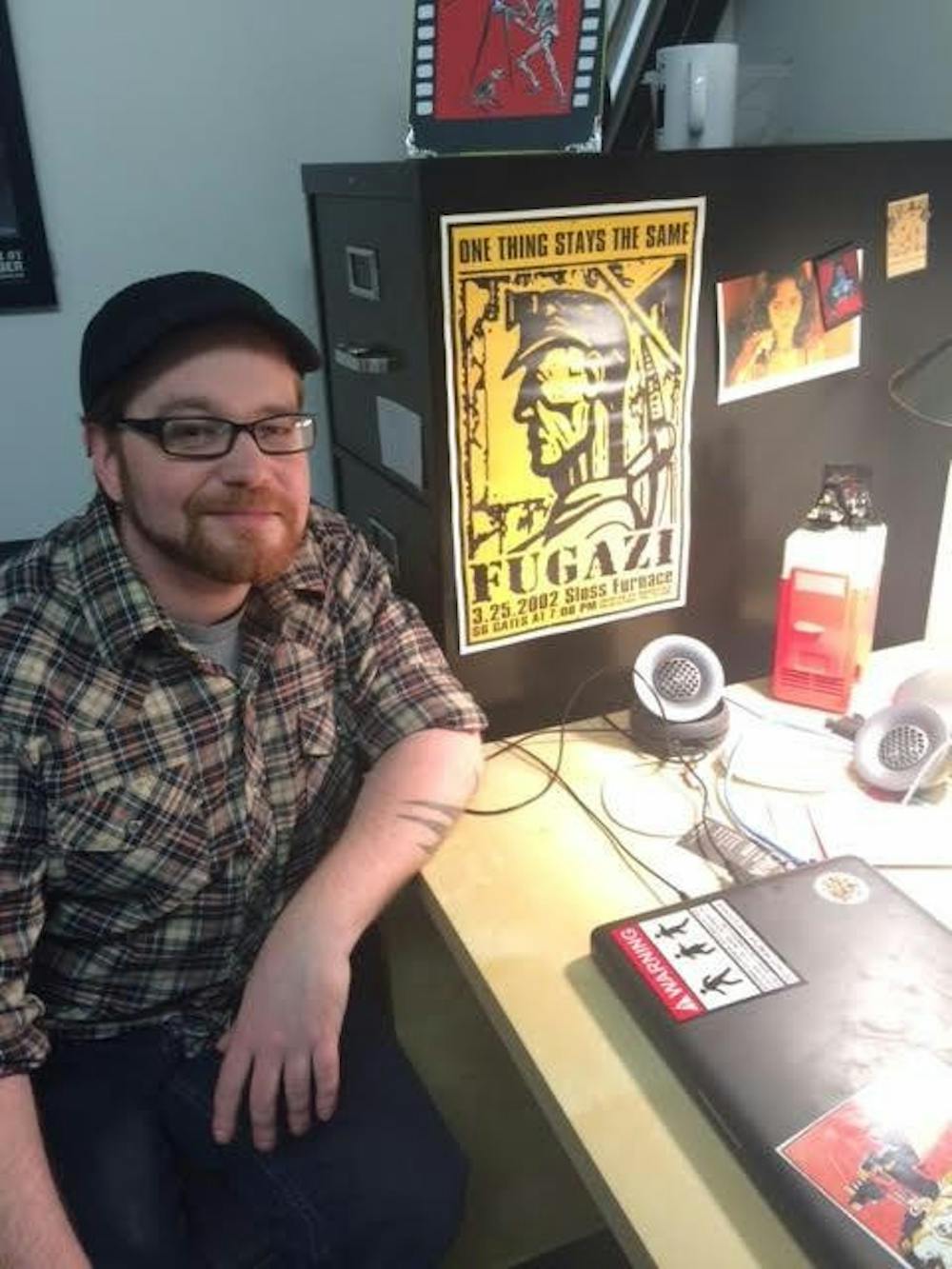Professors’ offices are their sanctuaries. Some like a plain office to grade work in silence. Some professors like to decorate their desks with pictures of their kids and spouses, as a happy reminder. For film and media arts professor Kyle Brannon, his office is a place to glorify rock ‘n’ roll. Fugazi posters cover his walls in dedication to his punk affinity, which bleeds into his professional life. Brannon co-produced and directed the documentary “An Impression: Dischord Records. Fugazi, Minor Threat and other punk bands were featured on Dischord Records in the 80s and 90s, during D.C.’s hey day.
Brannon currently teaches visual literacy, film and video production and production practicum on Final Cut Pro.
Eagle: What’s your favorite genre of music?
Brannon: Rock ‘n’ roll, in general. I do have an affinity for what most people would call punk rock, but I also like a lot of metal. I like a lot of old time rock ‘n’ roll. I’m a big fan of just rock ‘n’ roll and variations of that. -
E: What does rock ‘n’ roll mean to you?
B: It’s all context. If we’re talking about music—metal is rock ‘n’ roll, bluesy men in a bar cover band is still rock ‘n’ roll. It all falls under that. If you’re talking sound, it’s usually guitar. Can a rap group be rock ‘n’ roll? Of course it can. Can reggae be rock ‘n’ roll? Of course it can. The Police to me are rock ‘n’ roll. When I think of rock ‘n’ roll, I’m using it as a term to say I probably don’t know about a DJ—which is funny because I work with DJ’s — or a soundtrack artist, or certain realms of hip-hop or certain types of country. And more often than not when I say country, I raise my eyebrow because when most people say country they mean it’s pop and terrible. I like country, I really do actually. The country music awards aren’t giving the awards to country artists--ever. They’re giving their awards to people in cowboy hats.
E: When you were a kid what did you listen to?
B: I went through a classic rock phase. I grew up in Pennsylvania, in a town called Carbondale. A small city or a big town. Until a certain point in high school, I wasn’t exposed to a certain type of music that I now love. So I went to my father’s music and my father’s cassettes, and those were classic rock. I was a big fan of ‘60s and ‘70s classic rock. I remember driving around with him in the country listening to Led Zeppelin, Jethro Tull, Jimi Hendrix and these were the bands I got into first. I still have a real soft spot for classic rock.
E: What are your favorite bands?
B: Pixies, Fugazi, The Clash. It’s not that I don’t like modern music, it’s just no one has overtaken those as being my three favorite bands.
E: What concert stood out to you the most?
B: That’s a tough one. There are a lot of bands I can say I’m glad I saw. I will probably never bother to see the Rolling Stones again, and they will probably be playing well into my 90s, but they’re a band I’m happy to have seen. My favorite concerts are probably very high-energy concerts that I was just really, really happy to be seeing. I can tell you in recent times, I saw Shudder To Think, a D.C. band and they played an anniversary party at the Black Cat. I got into them a bit late, it may have been after they technically broke up in the ‘90s. It was really amazing, it had been a while since I saw a band and thought,they’re playing that song I love live.
Another concert I felt that way with was when I saw the Pixies live. I saw them when they got back together and it was awesome. Another concert was Hot Snakes at the 9:30 Club and they just rocked and then got off the stage. They exploded for an hour and then were like 'Thanks, goodnight.' John Reiss was just killing that guitar. It was a force of music and energy.
E: What album do you think every AU student should listen to?
B: There are a number of albums that come to mind that I think are front to back perfect, but I think I have to go with The Clash’s "London Calling." It’s 36-years-old and it still holds up as a great album.





